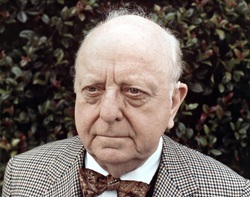
I was reminded of this never-ending conundrum when I ran across an article online about theatre people – actors, playwrights, directors – as critics (see here). And as today marks the official launch of my new CD, Colin Eatock: Chamber Music (see here), I thought it would be an apt occasion to address this issue. It will, I trust, come as no surprise for me to say that I’m basically pro-composer-critic.
Those who are skeptical of composer-critics are more likely to cite Virgil Thomson, as an example of a writer who actively courted conflict-of-interest situations to further his compositional career. My own criticism instructor, Harold C. Schonberg of the New York Times, was firmly of this view. “Before Thomson retired, he was the most performed composer in America,” Schonberg told me. “And after he retired, he was the least performed composer in America. And everyone knew why.”
Other arguments can be added to both sides of the ledger.
Composer-critics can be expected to understand the nuts-and-bolts mechanics of music in ways that few other people – even other musicians – do. They know about the different kinds of mallets that are used on a marimba, what key a harp is tuned to, and what the range of a bassoon is. Whereas performing musicians tend to have a highly specialized knowledge of their particular instrument and its repertoire, composers tend to have a broader understanding of music’s technicalities.
Moreover, composer-critics can be reasonably expected to care deeply about music. After all, it’s not as though most “classical” composers nowadays are in it for the money. Most toil over their scores with an intensity that lies somewhere between a labour of love and an obsessive-compulsive disorder.
On the other hand, composer-critics may give the impression that their musical tastes are divorced from those of the average concert-goer: that they are cheerleaders for weird modern stuff that has almost no following. Similarly, they may also give the impression that they’re so immersed in new music that they have little interest in anything written before 1900.
But are composer-critics and “critic-critics” (if you will) really so different? Whether an active musician or not, any critic worth his or her salt will have an “agenda” – an aesthetic position, and a keen sense where classical music should be going.
And both kinds ask their readership to accept them on trust – although in different ways.
The composer-critics ask readers to believe in their integrity – that they are rigorously honest in the expression of their opinions, and aren’t involved in any mutual back-scratching arrangements that couldn’t stand the light of day.
Critics who aren’t composers (or performing musicians) ask their readers accept on faith that they are exceptionally committed, knowledgeable and insightful, where music is concerned.
Such critics may hold up degrees or conservatory diplomas as proof of their musical education, and that’s all well and good. But it isn’t quite the same thing as composing a new work and saying to the world, “On this you may judge my musicality: my knowledge of musical craft, and also my sense of what is musically effective, engaging and satisfying.”
Sadly, both kinds of critic have been known to abuse their readers, and the musicians they write about. The annals of music criticism include both unscrupulous self-promoters and musically ignorant impostors.
To say that composers shouldn’t be music critics is tantamount to arguing that they should be silent in the public arena of musical opinion. In other words, they should “shut up and write music.” Yet composers who venture into criticism are willing to put their money where their mouths are. (Or, to invoke another analogy, they are prepared to cut themselves enough rope to hang themselves.) If they have something to say, and are willing to say it, they should be heard.
© Colin Eatock 2012
 RSS Feed
RSS Feed

